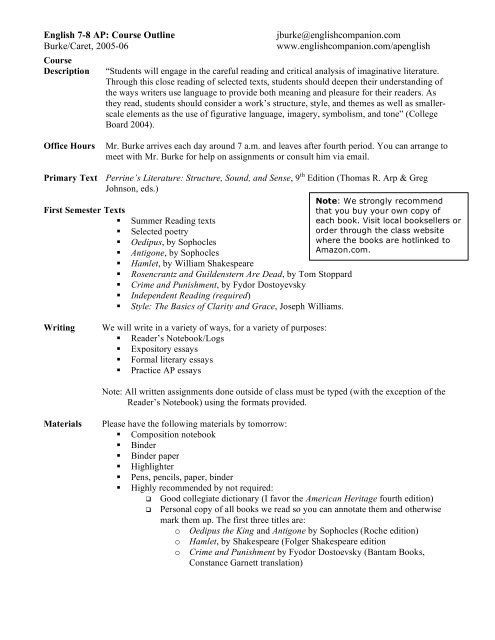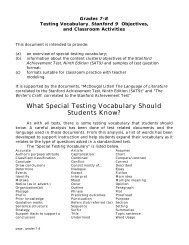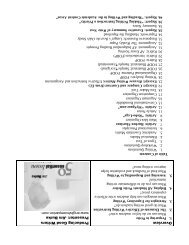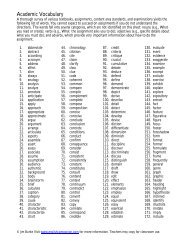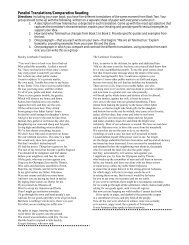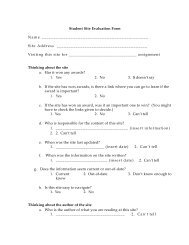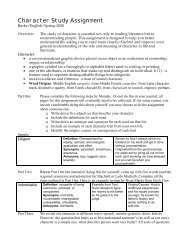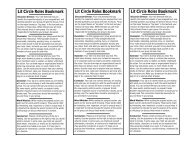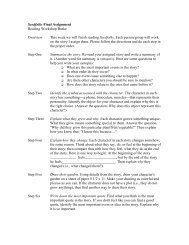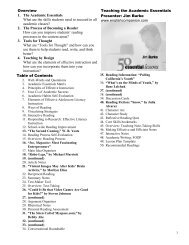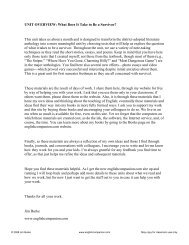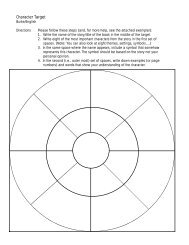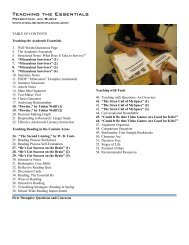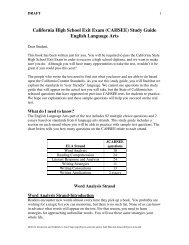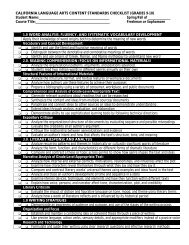Course Syllabus (.pdf) - English Companion
Course Syllabus (.pdf) - English Companion
Course Syllabus (.pdf) - English Companion
Create successful ePaper yourself
Turn your PDF publications into a flip-book with our unique Google optimized e-Paper software.
<strong>English</strong> 7-8 AP: <strong>Course</strong> Outline<br />
Burke/Caret, 2005-06<br />
<strong>Course</strong><br />
Description<br />
jburke@englishcompanion.com<br />
www.englishcompanion.com/apenglish<br />
“Students will engage in the careful reading and critical analysis of imaginative literature.<br />
Through this close reading of selected texts, students should deepen their understanding of<br />
the ways writers use language to provide both meaning and pleasure for their readers. As<br />
they read, students should consider a work’s structure, style, and themes as well as smallerscale<br />
elements as the use of figurative language, imagery, symbolism, and tone” (College<br />
Board 2004).<br />
Office Hours<br />
Mr. Burke arrives each day around 7 a.m. and leaves after fourth period. You can arrange to<br />
meet with Mr. Burke for help on assignments or consult him via email.<br />
Primary Text Perrine’s Literature: Structure, Sound, and Sense, 9 th Edition (Thomas R. Arp & Greg<br />
Johnson, eds.)<br />
First Semester Texts<br />
<br />
<br />
<br />
<br />
<br />
<br />
<br />
<br />
<br />
Note: We strongly recommend<br />
that you buy your own copy of<br />
Summer Reading texts<br />
each book. Visit local booksellers or<br />
Selected poetry<br />
order through the class website<br />
Oedipus, by Sophocles<br />
where the books are hotlinked to<br />
Antigone, by Sophocles<br />
Amazon.com.<br />
Hamlet, by William Shakespeare<br />
Rosencrantz and Guildenstern Are Dead, by Tom Stoppard<br />
Crime and Punishment, by Fydor Dostoyevsky<br />
Independent Reading (required)<br />
Style: The Basics of Clarity and Grace, Joseph Williams.<br />
Writing<br />
We will write in a variety of ways, for a variety of purposes:<br />
Reader’s Notebook/Logs<br />
Expository essays<br />
Formal literary essays<br />
Practice AP essays<br />
Note: All written assignments done outside of class must be typed (with the exception of the<br />
Reader’s Notebook) using the formats provided.<br />
Materials<br />
Please have the following materials by tomorrow:<br />
Composition notebook<br />
Binder<br />
Binder paper<br />
Highlighter<br />
Pens, pencils, paper, binder<br />
Highly recommended by not required:<br />
Good collegiate dictionary (I favor the American Heritage fourth edition)<br />
Personal copy of all books we read so you can annotate them and otherwise<br />
mark them up. The first three titles are:<br />
o Oedipus the King and Antigone by Sophocles (Roche edition)<br />
o Hamlet, by Shakespeare (Folger Shakespeare edition<br />
o Crime and Punishment by Fyodor Dostoevsky (Bantam Books,<br />
Constance Garnett translation)
<strong>English</strong> 7-8 AP: <strong>Course</strong> Outline 2<br />
Independent<br />
Reading<br />
Academic<br />
Honesty<br />
All students must read at least five books from the “Independent Reading” list (three during<br />
the fall, two during the spring semester) by early May, 2006. Students must read one book<br />
and write the required paper each grading period prior to taking the AP test in May.<br />
Burlingame High School considers cheating or academic dishonesty to be a serious violation of<br />
school rules and has adopted procedures to deal with students who:<br />
1. Receive or provide information during a test.<br />
2. Receive or provide information on tests given during an earlier period.<br />
3. Use unauthorized material on tests.<br />
4. Use ideas or written material from other sources––students, professional writers, internet<br />
notes/study guides ––without acknowledging the source in their own writing.<br />
5. Use or copy another student's homework when not authorized by the teacher to do so.<br />
6. Allow other students to use their work on assignments.<br />
Consequences (Student Handbook)<br />
The official school consequences are listed below. In addition to those, I will refuse to write<br />
any letters of recommendation and will, if necessary, notify the university if the incident<br />
should happen later in the year.<br />
First Offense<br />
• Student is given a zero on the compromised work.<br />
• Student is referred to administration for disciplinary action<br />
• Parent and student sign a contract that notifies a second offense will lead to<br />
• student being dropped from course with an F.<br />
Second Offense<br />
• Student fails the course.<br />
• Student is referred to administration for disciplinary action.<br />
Habits of<br />
Mind The University of California and California State University released a joint report in 2003<br />
listing those “habits of mind” that lead to university success:<br />
Broad Intellectual Practices:<br />
• Exhibit curiosity<br />
• Experiment with new ideas<br />
• See other points of view<br />
• Challenge one’s own beliefs<br />
• Engage in intellectual discussions<br />
• Ask provocative questions<br />
• Generate hypotheses<br />
• Exhibit respect for other viewpoints<br />
• Read with awareness of self and others<br />
Classroom Behaviors<br />
• Ask questions<br />
• Be attentive in class<br />
• Come to class prepared
<strong>English</strong> 7-8 AP: <strong>Course</strong> Outline 3<br />
• Complete assignments on time<br />
• Contribute to class discussions<br />
• Attend class regularly and on time<br />
Additional College Expectations<br />
• Respect facts and information in situations where feelings and intuitions often prevail<br />
• Be aware that the rhetoric of argumentation and interrogation relate to varied academic<br />
disciplines, purposes, and audiences<br />
• Embrace the value of research to explore new ideas through reading and writing<br />
• Develop a capacity to work hard and to expect high standards<br />
• Show initiative and develop ownership of one’s education<br />
Grading<br />
Missing/Late<br />
Assignments<br />
Attendance<br />
Extra credit is not available in this course.<br />
• 25%: In-class, timed essays (based on AP 1-9 rubric)<br />
• 30%: Essays, projects completed outside of class<br />
• 15%: In-class response writing, reading notes, etc.<br />
• 10%: Participation/Habits of Mind/Attendance<br />
• 20%: Final examination<br />
All missed assignments can be submitted within two days of an excused absence. No<br />
missed assignments will be accepted if you are present but have not completed the work.<br />
If you have a planned absence, any pending assignments must be submitted before you<br />
leave. Should you be absent the day a major assignment is due, you must email the<br />
completed assignment to me by the time our class meets. Failure to do so will be the<br />
equivalent of not doing the assignment. Check School Loop for information on that day’s<br />
or past assignments.<br />
Follow school policies outlined in the planner. Vacations are not automatically excused<br />
absences.<br />
Inconsistent attendance invariably leads to increased stress: too much make up work,<br />
loss of continuity with class activities, and inability to participate fully in discussions.<br />
Senior year is a time when many of you are overwhelmed by the demands of several AP<br />
classes and college visits. Also, many of you hold leadership positions in the school or<br />
participate in athletics, band or drama. Learning to manage yourself is essential to your<br />
success at home, in school, and at work.<br />
In addition, you should not assume it is okay to miss class just because a teacher or<br />
advisor asks you to. Presenting a note from a teacher or advisor after the fact will<br />
not be acceptable behavior. I will count such absences as unexcused; I will not<br />
accept late work under such circumstances. Please tell your teacher or advisor that<br />
you cannot miss a class unless you have been excused beforehand for an approved<br />
school activity (e.g. a tournament, special concert, leadership workshop, etc.)<br />
Ten absences in a semester and more than three tardies in a grading period will lower<br />
your grade. Use good judgment and demonstrate responsible decision-making to ensure<br />
your success in this class and your adult life.


